It was just this week that the FC Dallas’ Academy won the 2019 MLS Academy of the Year award. That award should come as no surprise given the heaps of praise for the FCD Academy we are used to hearing. All over MLS and throughout soccer in the US, Los Toros are praised for their youth division.
But why is the FCD Academy admired? What exactly is so great about it? How does the FCD Academy do what it does?
Well, good readers, that’s exactly what I’m going to try and lay out for you today.
I’m sure that many other academies and even other local teams work in the same fashion as FCD. After all, there are many other excellent teams in this country and here in town and they probably do things similarly. This is just how I’ve witnessed that FCD does it.
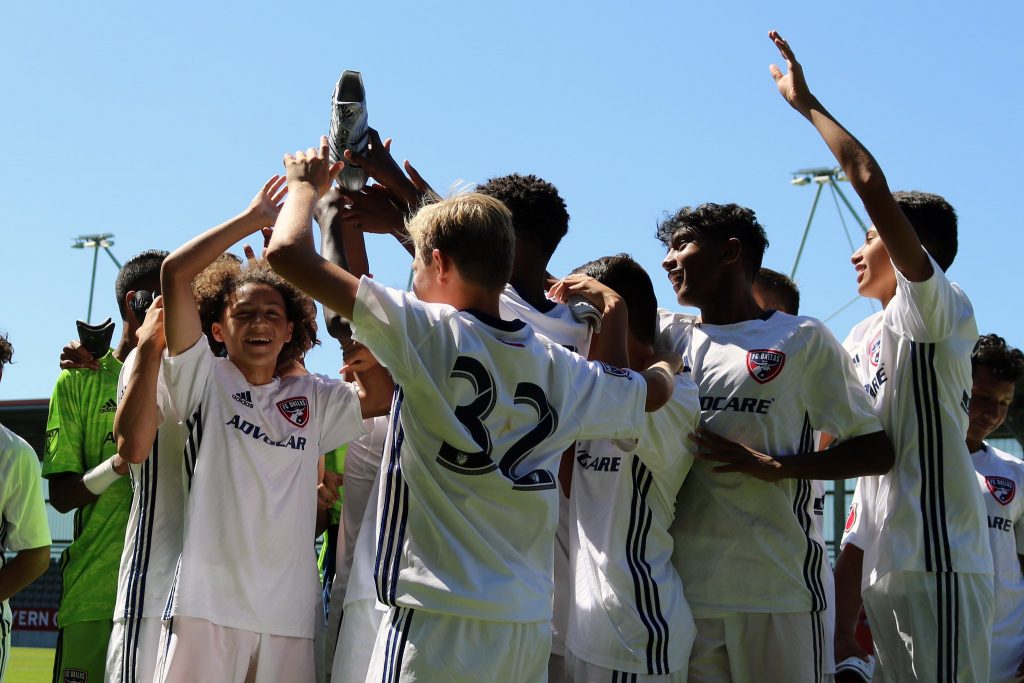
1. Player Development is Job One
A lot of FC Dallas fans may not even be aware the Academy has multiple goals, the least of which is “winning.”
The Academy, first and foremost, is about developing professional players. The “Pathway to the pros” it’s often referred to. You can quickly look at the number of pros for FC Dallas that have come out of the Academy as Homegrowns over the years and see how effective they are.
But it’s not just about pros. The FCD Youth and Academy core philosophy includes the development of all their players. It’s very important for the players who aren’t going to be in the pro game to progress and make a college career. FCD wants to create opportunities for everyone in their Academy to advance as far as they can in soccer. Take a look at the College Signing Night to see the pride in the program for players making it to the college level.
One way this philosophy manifests itself is through the use of what the club calls “Designated Players.” (I don’t know if this is US Development Academy term or just an FCD term).
It’s not the same thing as an MLS DP of course. DPs at the FCD youth level are players who play for both the Academy and for FCD Premier, the level right below the Academy. FCD doesn’t want a player who isn’t in heavy minutes or starting rotations to sit the bench and never play.
These DPs train with the Academy and with Premier. When they aren’t needed to play with the Academy they play with Premier. When they are needed for the Academy they play with the Academy.
The system means more players are getting coaching, game action, and exposure to college coaches. This system maximizes opportunities for kids, even if they aren’t kids who will be on track to be professionals.
As an example, Kevin Kim was a DP for FC Dallas in 2019, he’s gone on to Mercer to play college soccer. Kim played in 16 games this season as a freshman.
After that? Sure, win games and trophies. Win as much as you can. Winning is one of the best was to gauge progress.
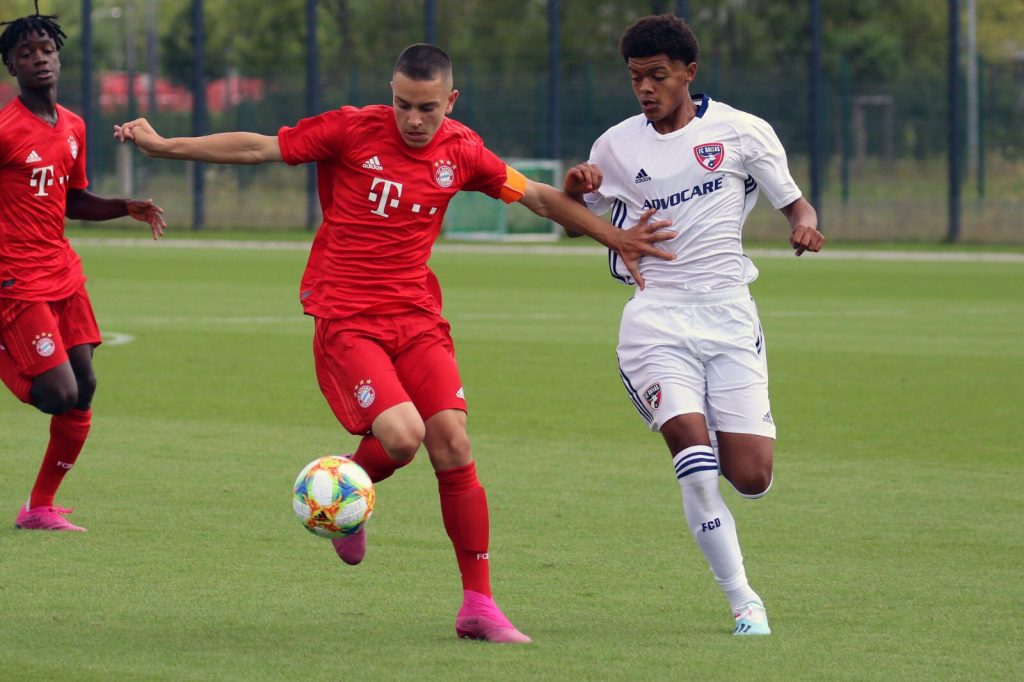
2. Single Playing Style and Coaching Philosophy
One of the core principles of the Academy, which was put in place by Oscar Pareja and Chris Hayden back in the day, and is carried on by Hayden and Luchi Gonzalez now, is that the entire Academy uses the same style of play and coaching philosophy.
The club emphasizes top to bottom the same profiles for players. They have a unified scouting goal and unified coaching goals. Bringing in players who fit the right profiles with the right talent. Coaching them to develop and to fit the system. Training their coaches in a singular philosophy and method of development.
In fact, FC Dallas maintains a scouting book on each player in their system. They evaluate all of the kids on 40+ criteria and track their development over time. Monitoring their progress with in-depth evaluations.
This way, as players move up and down age groups and change from coach to coach, there is no delay in progress or reset to a new system. It’s step by step up the ladder without any missteps or resets all the way to the pro team.
You can watch any FCD Academy team play – I’ve watched U13 and up – and see the core elements of the way FCD plays in MLS.
You can often find the FCD first-team staff and coaches out watching the Academies play on the weekends. Both Oscar Pareja before he left and Luchi Gonzalez now often watch. So too do I see other first-team assistants out. Many of the North Texas SC coaches except Eric Quill double dip as Academy couches.
3. Strong Talent Recruitment
FC Dallas actively recruits locally, nationally, and internationally. They have players from all around the Metroplex, from all over the US, and from other countries (most notably from Mexico).
The FCD Academy has reached a level of respect in player development, and as a pathway to the professional game, that the club is constantly being contacted from all over the US by players wanting to join up.
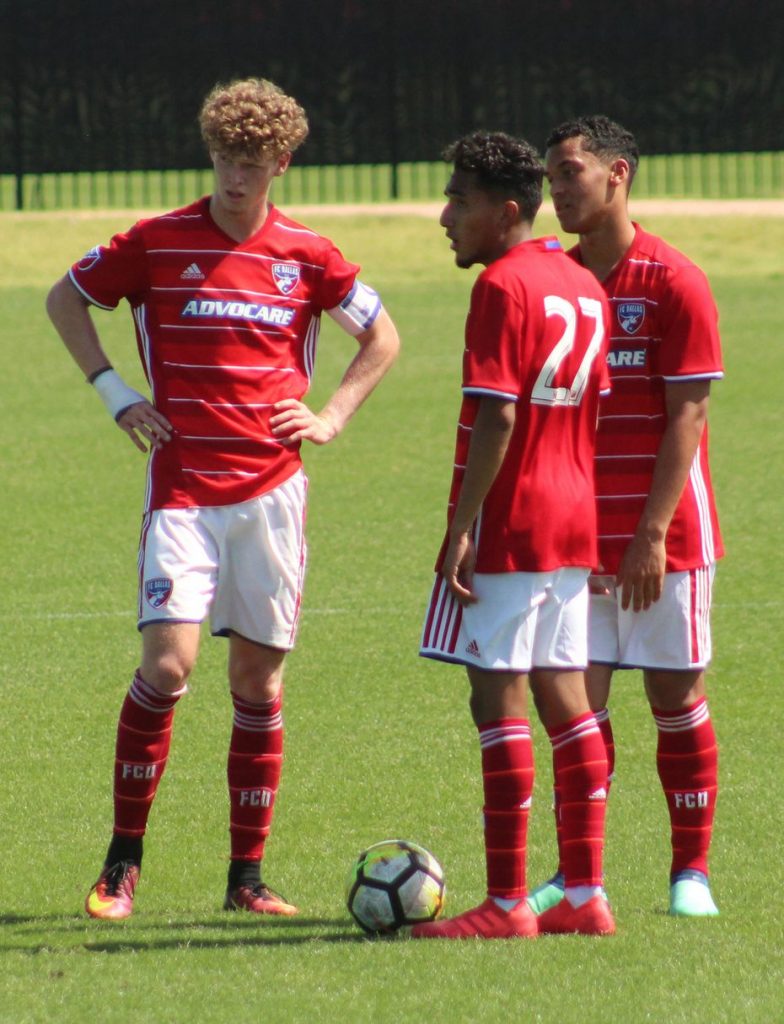
FCD is always on the lookout for talent. There are players who will progress through the Academy from their earliest ages – Jesus Ferreira, for example, who started as a U9 if I recall correctly – just as there are kids who might get recruited in for a final senior season at the age of 18 – Chris Richards and Chris Cappis to name two recent examples.
FCD will often seek out the very best player from another team, often this player is #10 or striker, and bring them to FCD to play a completely different position like outside back. The FCD goal is to recruit the best talent they can across the entire team.
To facilitate this, local FCD players’ families will often host out of town kids in their own homes. FC Dallas also has two houses located together with a host family that looks after multiple kids. And FCD has a couple of apartments near their training facility that can be used by older kids who are of a certain age and maturity.
Again to use Chris Cappis as an example, he was 18 – legally an adult – when he came to FCD and didn’t require a host family.
4. Multiple Affiliates
FC Dallas recruits players for their Academy from the numerous affiliates the club has. Obviously FCD Youth, which includes Premier and multiple other levels here locally, is a big feeder to the Academy. But FCD also has clubs around the US and in other countries that can, and do, feed it players.
Here’s the current list:
- FC Dallas Alamo Area (San Antonio)
- FC Dallas Central Arkansas
- FC Dallas Costa Rica
- FC Dallas East Texas & NW Louisiana (Tyler, Shreveport, etc.)
- FC Dallas El Paso
- FC Dallas Emerald Coast (Florida)
- FC Dallas Guaynabo (Puerto Rico)
- FC Dallas Laredo
- FC Dallas Monterrey
- FC Dallas Rio Grande Valley
- FC Dallas Texoma
- FC Dallas West Texas (Abilene, Lubbock, Midland)
El Paso has perhaps been the biggest contributor to date with players like Ricardo Pepi and Nico Carrera having come from there.
This list of affiliates is always getting bigger, I know of at least one affiliate coming soon in another country. FCD shares its coaching philosophy and team system with these affiliates thus further integrating players from all over the system to fit the club’s style.
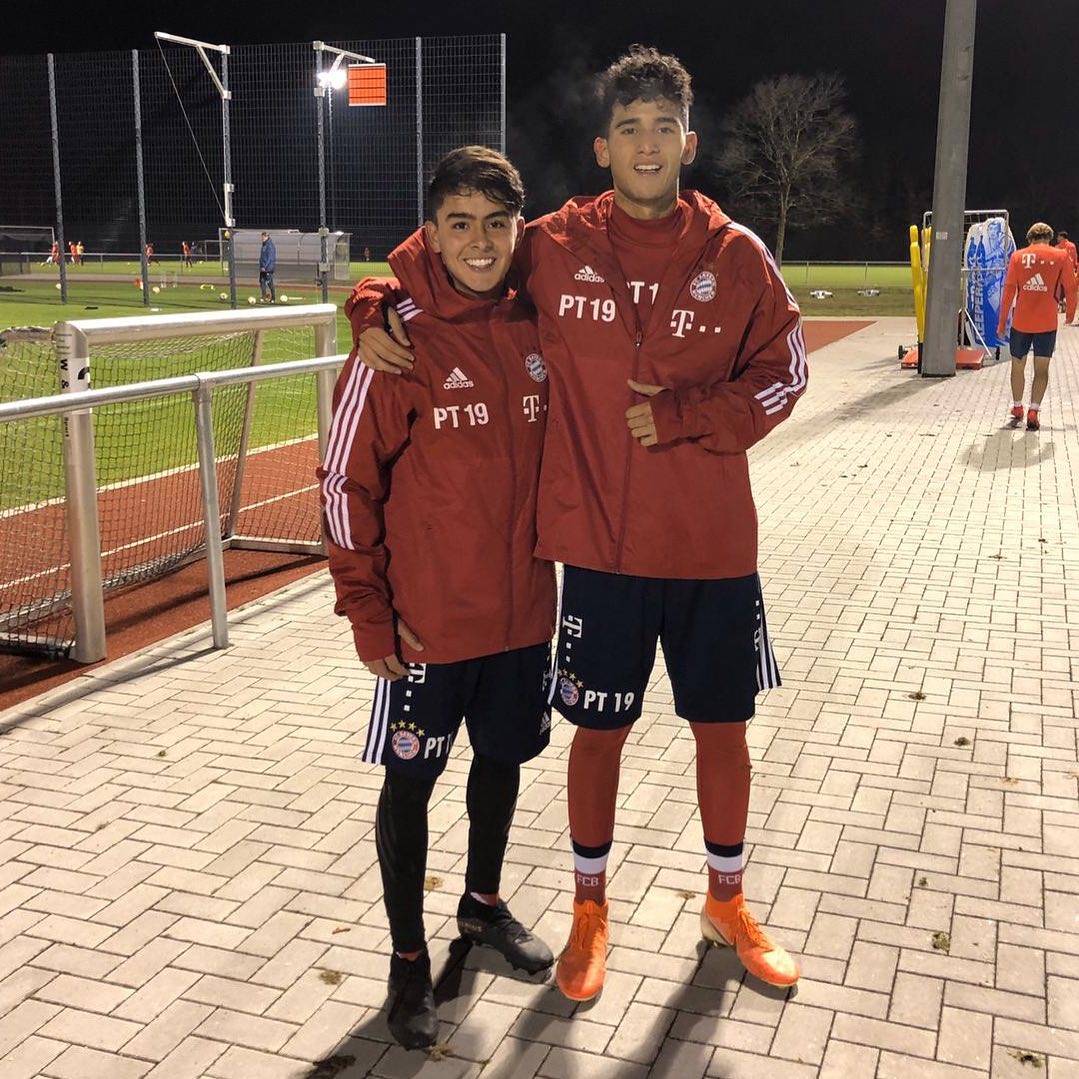
5. Promote Players to the Highest Level
FCD, quite obviously, moves the best players from all their affiliates and FCD Youth up to the Academy.
For the truly elite players, FC Dallas will promote them up age brackets to face a greater challenge. The idea is to put the player under the most stress they can handle.
This is most obvious in the Homegrowns who are signed at 15 to 19 and brought into the MLS team. Dante Sealy is the latest 15-year old with an MLS contract.
But throughout the system, players are moved up and challenged against tougher opponents. U19s like Tanner Tessmann and Kevin Bonilla commonly play with North Texas SC. As does U17 Jonathan Gomez, who not only plays with NTX but also frequently with the U19s. Beni Redzic and Gibran Rayo both played with the U19s while they were still U17 eligible. Current U14 Matthew Corcoran often plays up with the U15s.
FCD when in need of a player long term at any age level will usually look to bring someone up from a younger age bracket rather than bring someone from a level of play below the Academy.
One side aspect of this idea of challenging players is occasionally using players in positions that make them uncomfortable. This is mostly articulated by playing kids on their opposite side. Playing a lefty at right back or wing perhaps. To give a real-world example you might have seen, Brecc Evans played as a left center back as a u19 in the Academy and this year with North Texas SC he played as a right center back.
6. International Tournament Challenge
For a club like FC Dallas, with their talent level, many Development Academy games aren’t good enough to push their players. You’ll see a fair amount of rotation in FCD teams during the DA regular season depending on opponents.
The DA reaction to this opposition quality issue – it’s not just an FCD problem – is why you saw the new two-tier system put in place this season by the US DA.
You see, there was an undercurrent bubbling the last few years that MLS was going to pull all their DA teams to make an MLS only Academy league. No, not every MLS team is great or even good. But you can see why that discussion caused this DA shift.
It’s also why the DA Cup was implemented to create different game pressures with some tournament type structure including knock out phases.
This competition issue is one reason why FC Dallas puts a lot of emphasis on big international tournaments. Dallas Cup, for example, is a big priority, as is the MLS run GA Cup. Trips like the U15s adventure at the Bayern Munich Campus Tournament – won by the FCD this year – are key. The LigaMX Sub International tournament for the U17s every year is important. Even the DA Playoffs have enormous value because of the intensity of games and level of play.
This philosophy of making players uncomfortable is also why FCD likes foreign training stints for their youngsters. Putting the best players in uncomfortable situations in a foreign country with different coaches, different players, strange living conditions, and strange grounds… all of it puts the player in difficulty and helps develop them mentally and physically.
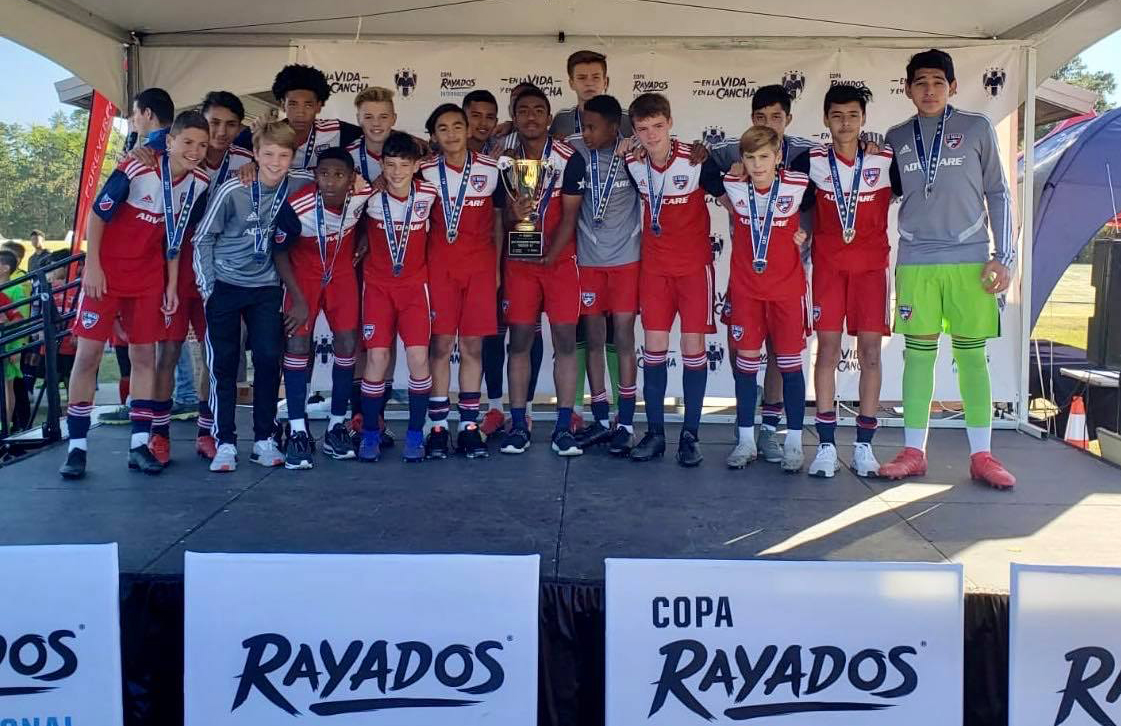
7. Pro Team Training Integration
Starting around when players hit the U17 level – if they are good enough – they get chances to train with FC Dallas’ MLS players. Sometimes it’s as a body to complete a drill. Sometimes it’s full integration in the squad for the entire session.
FCD has North Texas SC, the U19s, and U17s all train on fields right next to the senior squad. Not only does it make them feel integrated into one club, but it’s also quite easy for coaches to pull a player or two from one team or another in the middle of training.
It’s not just the cream of the crop players either. I’ve seen players from all levels of the Academy sides incorporated, from the very best future homegrowns down to the guys who are subs and DPs.
This taste of senior team training pushes the player, gives them a challenge and a level to shoot for. It lets them get a feel for what it really takes to even just train at the top level.
It can be both inspiring and frightening I would imagine.
8. Emphasis on Skill
Is FC Dallas interested in athletes? Yes, of course. But size and strength take a back seat to speed… and all three take a back seat to skill. Skill is everything. Ball skill, touch, passing, shooting, etc., etc.
This is most evident between ages 13 to 15 and can be downright laughable at times. Often in boys that age, depending on when puberty hits, you can get massive differences in size.
FCD doesn’t care. Go watch the U14s and you can see tiny – but skilled – FCD kids playing against boys literally twice their size. I’m talking about the head at waist level difference. Boys short of 4 feet tall against “boys” that are 6 feet or more already.
Not that FCD shies away from size specifically, look at Tanner Tessmann or current U17 Philip Akem. But size isn’t sought out, skill is.
Speed is deadly too, obviously, but speed alone won’t get a player into the Academy. There’s got to be skill on top of the speed.
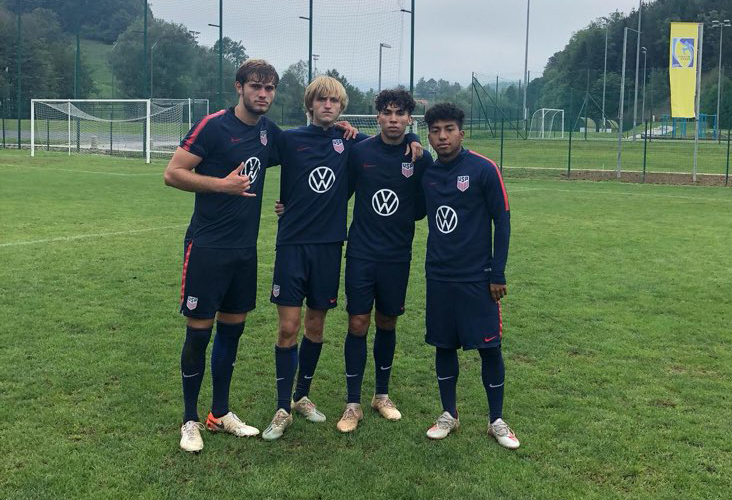
9. Challenge the Player to Make Decisions
One of the underlying tenants of the FCD program is the push to have players make decisions on the field. FCD coaches will often refrain from calling set plays, dictating kick takers, or mico-adjusting the game plan during a game.
Instead, the players are directed to use their own mind and figure it out. Players are not spoon-fed on the field and rather are pushed to adapt on their own. I’m sure we all remember the Oscar Pareja manta “Busca La Forma” aka “Find the Way.” That philosophy continues despite his departure.
Developing individuals at the highest level of the game who can make good decisions, influence games, and dictate play… That’s the core of FCD’s Academy.
10. It’s Free
Lastly, the FCD Academy is free. Last time I checked this is true of all the MLS Academies except DC United so it’s not totally unique by any means.
But for FC Dallas this means many players who would not be able to afford to play at this level in the United States – where it’s mostly pay-to-play – can play for FCD for free.
Or mostly free anyway. I’m told FCD budgets for two big tournaments a year per team, so anything extra – like the LigaMX Sub International tournament for the U17s – has to be fundraised for.
Should FCD cover more costs than they do? Yes, for sure. And I think that will come down the line as player sales and training compensation raise profits. More day to day expenses, more tournaments, more costs of living for the kids away from family, etc.
Perhaps a full and complete Academy with its own school and boarding type set up rather than relying on Frisco public schools and player home hosting. That might be a big step up in costs but one worth taking down the line.
But for now, it’s pretty close to completely free – as much as almost anyone else anyway – and that’s a good way to find and build the best talent.
Go See ‘Em Play
LT;DR – the FCD Academy is pretty darn good.
If you get a chance, you should go check ‘em out. It’s a fun watch.
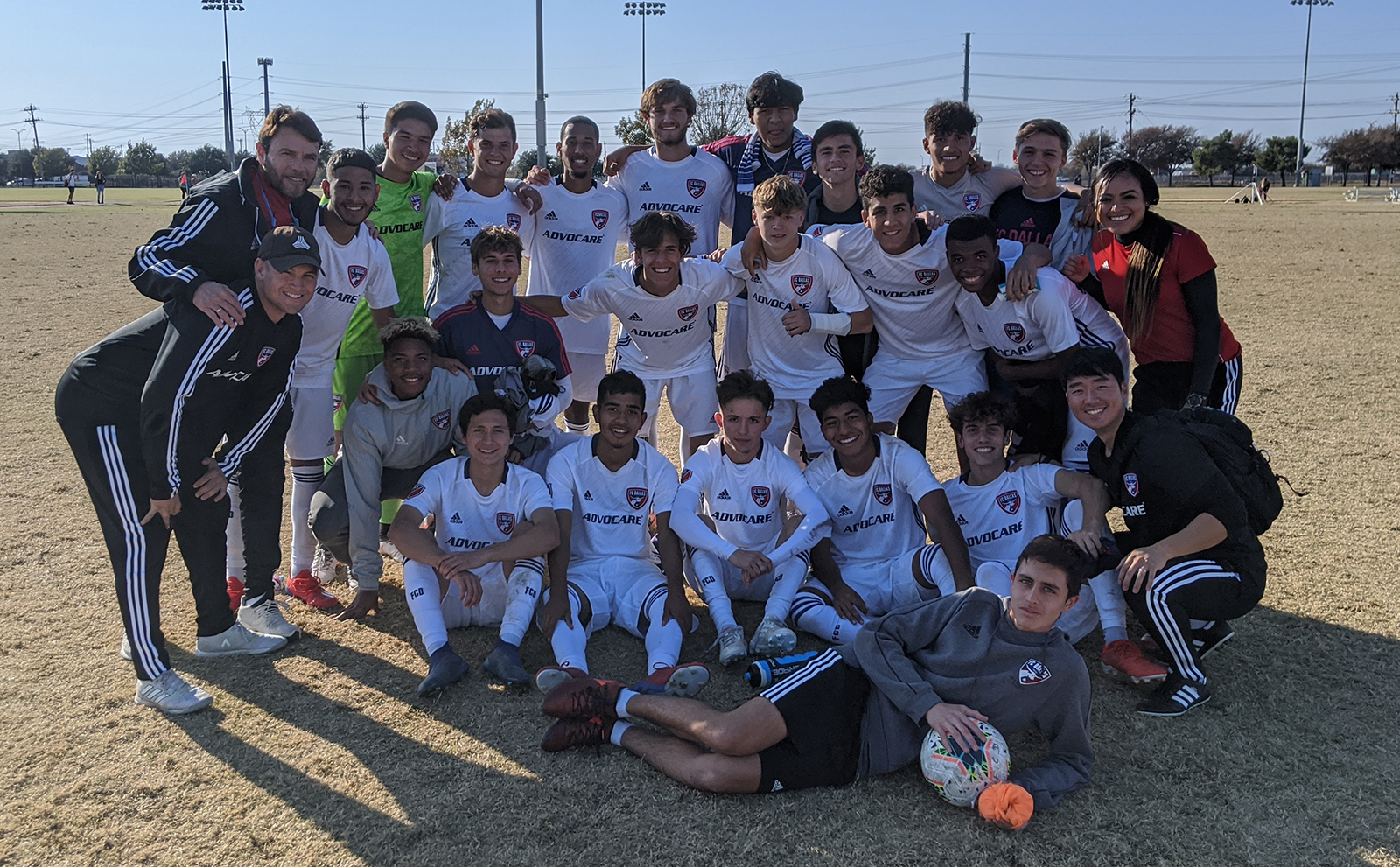

It would be awesome if the FCD Juniors in Frisco did #1 and #8; sadly they don’t.
Do you think they’d start up an affiliate in Houston/Austin/San Antonio when/if the domestic territory rules get lifted? Might also make sense to but one in Birmingham, Alabama (Servania, Chris Richards)
Terrific idea. I hadn’t thought of that.
Quill’s old club, Texans SC, would be a perfect fit, already have a relationship.
How likely is it that FCD will seek out local talented players on other Dallas teams and invite them to try out for MLS?
Do you mean as pros?
They hold (mostly) open tryout or North Texas every year.
If you mean as a youth, you have to be invited to try and from another club. FCD Dallas often ads 3-5 players a year to any given class from other teams.
They do have open tryouts for FC Dallas Youth some.